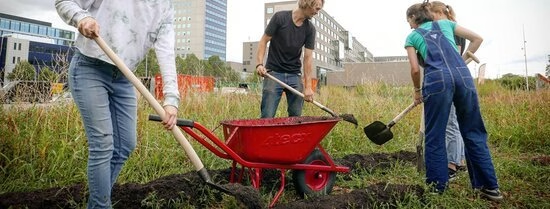The negative impacts of fast fashion, and waste at the Rotterdam market: for the past weeks, students of the minor Transformative Change for a Sustainable World have made a personal journey to propose solutions for current consumerism challenges society is facing.
The third edition of the minor ended with a closing session in November. Two groups of students presented the findings of their research. Their analysis had to be based on a problem under the scope of sustainable consumerism. Students were not only asked to research a current issue regarding sustainability, but they were also requested to propose a solution.
Fast fashion
Julide (19) is one of the minor students. Her group’s research was in the field of fashion. The problem they defined was ineffective communication. While many students would like to buy more sustainable clothing rather than fast fashion and on campus there are many sustainable initiatives to help with this, the university fails to effectively communicate. Therefore, students who are willing to do their bit remain unaware of the opportunities. Julide chose the minor because she is passionate about sustainability: ‘I study Health Sciences and while they touch upon sustainability, the program doesn't really offer any courses on the topic. The minor was fun because you got to experience different perspectives. Coincidentally, we’re all from different backgrounds, but we saw that sustainability is relevant in all our disciplines.’

Minor for every student
Coordinator Dr. Ana Vasques confirms that the minor is for students from all backgrounds: ‘This year we had students from Mechanical Engineering from TU Delft, Medicine, Communications, Sustainability, Economics, Politics and Public Administration. And in the years before we had even more different backgrounds. So it’s very diverse and really any student can take this minor.’
‘We started this minor as an initiative from the university’s Strategy 2024’, Dr. Vasques says. ‘There was a call for more sustainability in education, and the first thing to put in action would be a minor. The minor is an effort from the strategy with teachers from different faculties. In the minor we have the students following projects, so it’s very action-based. Each week, they work on a different theme and at the start they choose a problem to work on for the remainder of the course.’
No traditional classes
Student Julide liked the project-based character of the minor: ‘What’s exciting about this minor is that we get different types of academic lessons. We’ve had several guest lectures, and we went on a field trip to BlueCity, which used to be Tropicana. That was exciting because you see how people build their lives out of the initiatives they have created. We also had a visible mending workshop where we did handwork, like embroidery. So it’s not the traditional type of academic teaching. It’s unlike any lessons I had before.’
As for Julide, the minor made an impact: ‘I became aware of what is happening. I focus on anything renewable now and haven’t bought new clothes for three months! And after I finish my bachelor’s in Health Sciences, I am thinking of starting another bachelor in sustainability.’
Are you interested in the minor ' Transformative Change for a Sustainable World' or do you want to know more? Please contact coordinator Dr. Ana Vasques or visit the minor page.
- More information
- Related content

